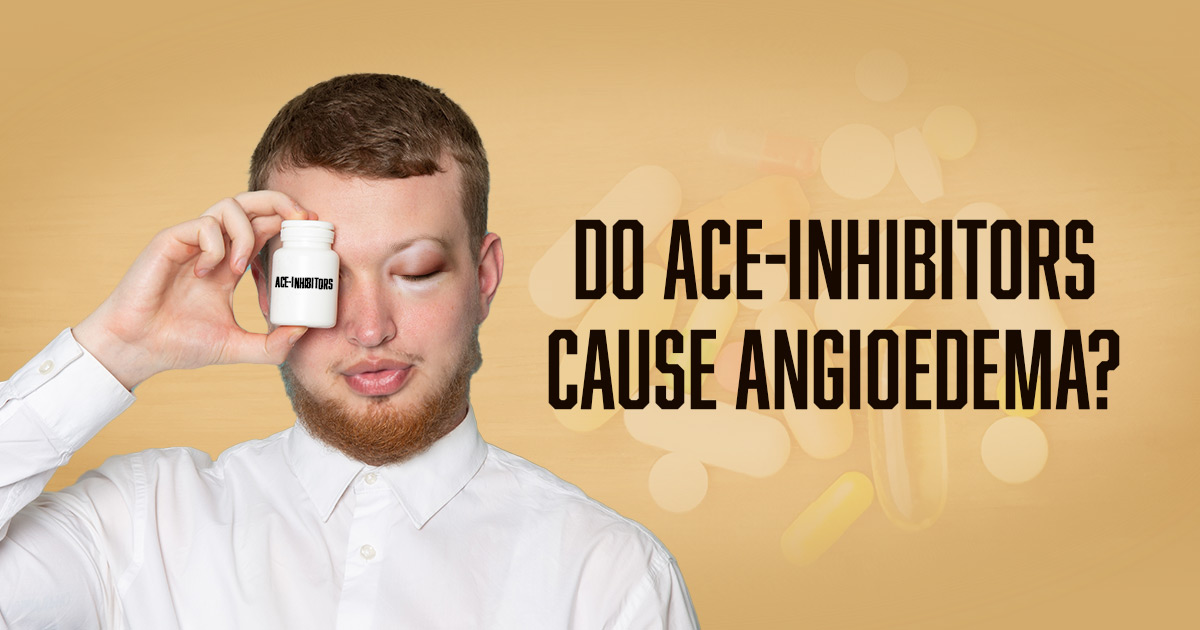Do ACE-Inhibitors Cause Angioedema? What You Need to Know

If you’ve been prescribed medication for high blood pressure or heart conditions, there’s a good chance you’ve heard of ACE inhibitors. These medications, like lisinopril, enalapril, and ramipril, are a go-to solution for managing not only hypertension but also heart failure and certain kidney issues. They come in easy-to-take forms like pills and tablets, typically with a once-a-day dosage. Their main job is to lower blood pressure by relaxing your blood vessels, making it easier for blood to flow through..
However, like any medication, there’s a small chance of side effects. While coughs or mild dizziness are fairly common, there’s a rarer and more serious reaction called angioedema. This condition causes sudden swelling, often in your face, throat, or even your gut. Don’t worry too much, though. It’s rare (affecting about 0.1–0.7% of users), but being aware of what to watch out for can make a huge difference.
Why Do ACE Inhibitors Cause Angioedema?
To get why ACE inhibitors can sometimes cause angioedema, we need to dig into how they work. These medications block an enzyme in your body that normally tightens blood vessels. When that enzyme is blocked, your blood vessels stay relaxed, and your blood pressure goes down. Sounds great, right?
Well, this enzyme does double duty. It also breaks down a substance called bradykinin that causes blood vessels to widen. When bradykinin sticks around too long because it’s not being broken down, it can make tiny blood vessels leak fluid. This leads to the tell-tale swelling seen in angioedema.
What sets this apart from an allergic reaction is that it doesn’t involve histamines, which is why typical treatments like antihistamines, steroids, or even EpiPens don’t work here.
What Does Angioedema Feel Like?
One weird (and scary) thing about angioedema caused by ACE inhibitors is that it can happen suddenly and pretty much out of nowhere. Here’s what to look for:
- Swelling in your face, lips, or tongue – This is the most common sign.
- Trouble breathing – If your throat swells up, it can feel tight or constricted.
- Abdominal issues – Some people experience swelling in their intestines, leading to pain or tummy troubles (even without swelling that’s visible externally).
Picture this. You’ve been taking your blood pressure medication for months, then one morning, your lips feel huge, and your tongue is thick. You’re not itchy; you don’t have a rash—but you know something’s not right. That’s when it’s time to act fast.
Who’s More Likely to Experience It?
Not everyone on ACE inhibitors ends up with angioedema. But a few groups are at higher risk:
- Older adults (65 and up)
- Women (we still don’t fully understand why yet)
- People of African descent – They’re about five times more likely to experience angioedema.
- Smokers or those who use medications like NSAIDs (e.g., ibuprofen)
- Individuals with prior issues like angioedema, ACE inhibitor cough, or inflammatory conditions (asthma, for example).
If any of these sound like you, don’t panic. Just make sure your doctor knows so they can keep an eye out.
What About Other Medications?
While ACE inhibitors are the main meds that cause angioedema, they’re not the only ones. Other drugs that might lead to it include:
- ARBs (angiotensin receptor blockers) – These are often recommended as safer alternatives but aren’t completely risk-free.
- NSAIDs, such as ibuprofen or aspirin
- Certain antibiotics, like penicillin
It’s always a good idea to mention any past reactions to your doctor, no matter how minor they seemed.
What Should You Do If It Happens?
If you notice sudden swelling while on an ACE inhibitor, especially in your face or throat, here’s what to do:
- Stop taking the medication right away – But make sure to call your doctor immediately to discuss next steps.
- Seek emergency help if your breathing or swallowing is affected – These symptoms can turn life-threatening quickly.
For mild cases, the swelling often goes down after stopping the medication. But there are treatments for severe cases, like icatibant, which blocks bradykinin, or even plasma infusions in extreme situations.
What’s Next After an Angioedema Episode?
If you’ve had angioedema caused by an ACE inhibitor like lisinopril, you’ll need to avoid that type of medication for good. Most doctors switch patients to ARBs, which work similarly to ACE inhibitors without causing bradykinin buildup. You might also be advised to avoid certain over-the-counter drugs like NSAIDs, which could worsen or trigger swelling.
Pro tip? Carry a medical alert card or bracelet that mentions your reaction to ACE inhibitors. It’s one of those things that may never be needed but could be a lifesaver in a pinch.
Or, if you’re on an ACE inhibitor and something feels off, listen to your body and talk to your doctor. They can prescribe alternative medications that work for you without risks. Your health is a partnership, and staying informed is one of the best ways to stay safe.
